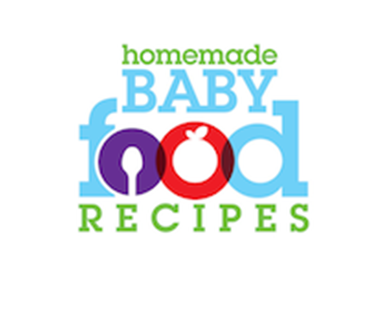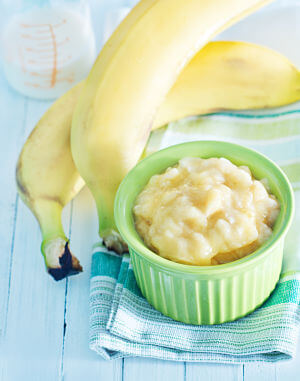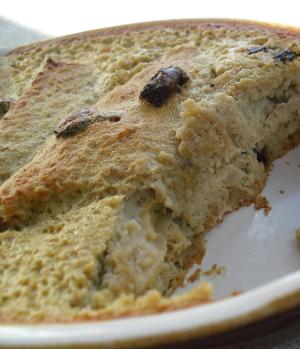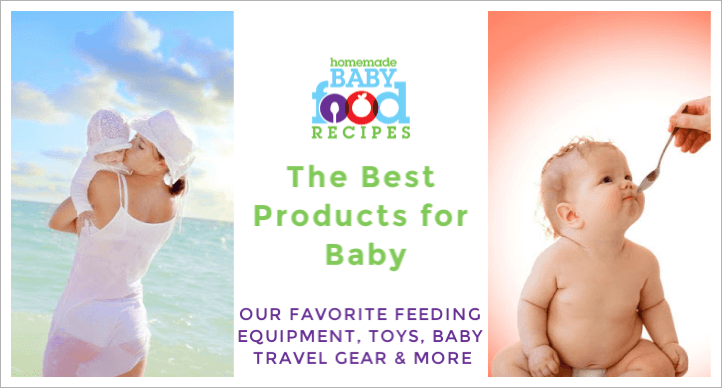Banana Baby Food Recipes and Tips
Updated: Aug 07, 2023
Learn how to prepare banana baby food dishes for your little one with our yummy recipes – and find out what makes banana such a nutritious food for your tiny diner!
Why Banana Baby Food Is So Nutritious
Bananas contain so many important nutrients that they can be considered one of nature’s most perfect foods.
Bananas are an excellent source of the essential electrolyte potassium, which is used by the muscles and regulates blood chemistry.
They also provide your baby with vitamin A, vitamin B6, vitamin C, calcium, magnesium, iron and zinc.
Babies love them because they have a natural sweetness that intensifies as they ripen, providing lots of energy for growth and development.
In addition, ripe bananas contain pectin, a soluble fibre that ‘keeps things moving’ through the digestive system and prevents constipation (do bear in mind, though, that unripe bananas often have the opposite effect and can cause constipation).
If your baby is recovering from a nasty bout of diarrhea, bananas can be useful in replacing the lost electrolytes.
And if these benefits weren’t enough, bananas are also good for the bones and teeth as their consumption is believed to improve the body’s uptake of calcium!
Bananas As a First Food
Bananas are often introduced to babies as a first food (see our Guide to Introducing Solids for more information).
Quite apart from being a wonderfully nutritious choice, ripe bananas are easily digestible and incredibly simple to prepare.
Did you know…
…that bananas do NOT grow on trees?
The banana plant is – in fact – a giant herb!
Generally considered to have a soothing influence on the digestive system, some sources recommend bananas as a good first food for babies with reflux.
That being said, many parents find that this is NOT the case and this visitor tells us about a reflux flare-up prompted by bananas.
It’s advisable, therefore, to introduce them carefully to a reflux baby and watch out for any worsening of symptoms over the next few days.
To prepare baby’s first banana baby food…
Simply peel a ripe banana and mash it with a fork!
You may add a little breast milk or formula to create a more suitable texture for your baby.
If your baby is at least 6 months of age (the typical recommended age for the introduction of solid foods), then additional pureeing should not be necessary.
Click here for more information about introducing solids before 6 months of age
Choosing The Fruit
HANDY TIP
Fully ripe bananas are better for baby as they contain more antioxidants than under-ripe fruit.
One of the best things about bananas is that they are not seasonal – subsequently, they are available all year round.
As you’ve probably noticed, ripe bananas are very vulnerable to bruising – therefore they are picked and shipped to the countries they are to be sold in before they are ripe.
They are then ripened in special rooms where they are treated with ethylene gas – OR they are taken directly to stores for retail (this is why you will sometimes find very green bananas available for sale).
‘Ungassed’ bananas (those NOT treated with ethylene gas) ripen more slowly, giving them a better flavour.
Unlike many fruits and vegetables, the flavour of bananas is NOT influenced by their size – large ones taste just as good as little ones!
However, you may wish to buy smaller bananas for your baby to help keep leftovers to a minimum.
In addition to yellow bananas, you can also find red – and even purple – varieties of the fruit, although these are most commonly found in ethnic markets.
Whatever the colour, ensure the bananas you buy are firm and unblemished.
Don’t buy very green bananas unless you are willing to wait for them to ripen for a few days!
You can, however, hasten the process by placing them in a plastic bag – this ‘traps’ them with the ethylene gas that they naturally produce, making them ripen even faster!
Once your bananas are ripe, you can put them in the refrigerator if you choose – the skins will likely go black, but this is purely cosmetic and won’t affect the quality of the fruit.
Do not, however, refrigerate bananas before they are ripe – if you do, they will never ripen… even when you take them back out!
Do you have more ripe bananas than you can use immediately?
Then just freeze them!
Either peel them, cut them into pieces and wrap them in a food-safe wrap – or freeze them in their skins.
You can then use them for future baby food recipes, smoothies or when baking!
Could My Baby Be Allergic to Bananas?
Bananas are not a common allergen – it is, however, possible to be allergic to ANY food, so you should always watch carefully for any sign of allergic reaction when introducing bananas to your baby.
There are two types of allergic reaction to bananas.
One is related to an allergy to latex – therefore you should discuss the introduction of bananas with your doctor if your child has a known latex allergy.
You will probably be advised to avoid bananas altogether for now.
The second type of allergic reaction to banana is related to pollen allergies and is known as oral allergy syndrome.
The symptoms – which appear quickly – usually involve swelling or itching in the throat or mouth.
ALWAYS consult your doctor if you suspect that your child is experiencing an allergic reaction to any food.
Banana Baby Food and Its Effect on Poop!
Eating bananas can change the appearance of your baby’s poo – sometimes causing little black ‘threads’ that look alarmingly like worms!
Visit our blog to read more about this common – but harmless – phenomenon!
Baby food around the world...
…Here in Indonesia, the most popular first solid for baby is indeed, banana.
But there are many kinds of banana here, so the most recommended one in called “king banana” because it’s more sweet and won’t cause digestive problems in babies.
This king banana has tiny black seeds at the center that we have to remove.
From mommy Shinta in Jakarta
Banana Baby Food Ideas
- Stir mashed banana into infant rice cereal (here’s a recipe to make your own).
- Add mashed banana to baby’s oatmeal/porridge.
- Use mashed banana as a quick and healthy sandwich filling.
- Make a healthy, fruity treat by mixing mashed banana with homemade yogurt, pureed strawberries (when appropriate) and topping with wheat germ.
- Mix with delicious homemade applesauce.
Does your baby struggle to grasp pieces of banana as a finger food?
Then coat them in crushed cereal or nutritious wheat germ to help him get a grip!
Banana Baby Food Recipes
Wholesome Banana Rice Pudding (6 months+)
4 oz (approx 1 cup) cooked brown rice
2-4 fl oz (1/4 to 1/2 cup) warm milk (the amount you use depends on the consistency required)
pinch cinnamon
pinch nutmeg
drop of vanilla essence
1 tbsp raisins, soaked in warm water or apple juice to soften them
1 small, ripe banana (sliced)
Preparation couldn’t be easier – just place all ingredients in a food processor and blend until smooth!
Baby’s Banana Custard (6 months+)
4 oz (approx 1 cup) cooked brown rice
2-4 fl oz (1/4 to 1/2 cup) warm milk (the amount you use depends on the consistency required)
pinch cinnamon
pinch nutmeg
drop of vanilla essence
1 tbsp raisins, soaked in warm water or apple juice to soften them
1 small, ripe banana (sliced)
2 egg yolks, beaten
8 fl oz (1 cup) whole (full fat) milk, breast milk or formula
1 tsp vanilla extract
1 small, ripe banana, mashed
- Preheat oven to 350 degrees (180 deg C).
- Spoon the mashed banana into the bottom of a small oven-proof dish.
- Stir together the beaten egg yolk, vanilla essence and milk.
- Pour the mixture over the mashed banana.
- Take a baking pan with sides and sit the oven-proof dish in the middle.
- Pour hot water into the baking pan until it comes about halfway up the sides of your oven-proof dish.
- Bake for approximately 30 minutes, until the custard has set, then cool and refrigerate. Serve chilled!
Handy tip
If you give your baby banana in a teething feeder, clean it immediately with a toothbrush. If you leave it on there too long, it is almost IMPOSSIBLE to remove!
Baked Banana and Apricot (6 months+)
4 oz (1/2 cup) dried apricots
1/4 tsp vanilla essence
drop of maple syrup (optional)
1 medium ripe banana
Preheat the oven to 375 deg F (190 deg C).
- Simmer the apricots in a little water or apple juice until soft, then puree them in a food processor.
- Combine the apricot puree with the vanilla and maple syrup (if using).
- Cut 2 equal pieces of foil. Place half the banana (cut lengthways) on each piece.
- Divide the apricot puree between each half of the banana and spoon over the top.
- Fold over the foil and seal, to create 2 parcels.
- Bake for 15 mins.
- Cool to a safe temperature, puree or mash as necessary and serve!
Easy Chicken and Banana (7 months+)
Sounds yucky? Our little ones loved – and still love – this recipe!
1 boneless, skinless chicken breast
1 small, ripe banana, mashed
4 fl oz (1/2 cup) coconut milk
- Split the chicken breast in half lengthwise.
- Stuff it with the mashed banana.
- Place it in a small, oven-proof dish and pour the coconut milk over the top.
- Bake at 350 deg F (180 deg C) for 30-40 mins, until the chicken is thoroughly cooked.
- Chop to size or puree and serve with brown rice!
Bananas on the go!
Planning a trip with your little one?
Bananas, which require NO washing and NO cooking, are one of the best foods to take with you when you’re out and about.
Baby’s Banana Curry with Chicken (7 months+)
Find out more about using spices in your baby food recipes
8 oz (1 cup) boneless, skinless chicken breast, cubed
2 tbsp plus 1 tbsp vegetable oil
1 small onion, chopped
pinch of each of the following: ground coriander, ground cumin, ground turmeric, ground ginger,
ground cinnamon, ground cardamom
1/2 tsp chopped fresh garlic
1 bay leaf
1 cup (8 fl oz) homemade (or low sodium) chicken stock
1/2 apple, peeled, cored and diced
1 tbsp sultanas
3/4 tbsp flour
1 ripe banana, sliced
2 tbsp chopped fresh parsley
- Gently saute the onion in 2 tbsp of the oil until tender, then stir in all of the spices and garlic and continue to cook for a further 5 mins, stirring constantly.
- Slowly stir in the stock and add the bay leaf, then raise the heat and simmer rapidly for a few minutes.
- Stir in the diced apple and sultanas and lower the heat to a gentle simmer. Cook, uncovered, for 5 minutes.
- Toss the chicken cubes in the flour until thoroughly coated, then (in a separate pan) heat the remaining 1 tbsp of oil and brown the chicken on all sides to seal it.
- Add the chicken cubes to the curry sauce and cook for a further 10 mins, stirring often.
- Finally, stir in the sliced banana and parsley.
- Chop, mash or puree as appropriate and serve with brown rice for a gourmet dinner for baby!
Blueberry and Banana Popsicles (6 months+ – great for teething)
4 fl oz (1/2 cup) blueberry juice
1 envelope gelatin (unflavoured)
8 fl oz (1 cup) vanilla yogurt (or use natural
yogurt and add a little vanilla essence)
4 oz (1/2 cup) fresh blueberries
1 medium, ripe banana, sliced
- Heat the blueberry juice gently in a small saucepan and stir in the gelatin.
- When the gelatin has completely dissolved, pour the mixture into a food processor.
- Add the yogurt, blueberries and banana and puree until totally smooth.
- Pour the mixture into popsicle (lolly) moulds and freeze.
Soothing Banana Fingers (6 months+)
1 ripe banana, cut into thick ‘fingers’
natural yogurt
wheat germ
- Dip each banana finger into the yogurt, then drop it into a small dish of wheat germ, turning it over and over until thoroughly coated.
- Place the coated banana fingers on a baking sheet lined with greaseproof paper (baking parchment).
- Freeze until firm, then serve – a wonderful finger food to provide relief for sore gums!
Quick and Easy Fruity Bars (For babies enjoying finger foods)
These sugar free bars are firm on the outside, ‘squidgy’ in the middle, plus they’re free of sugar, egg and wheat. Best of all, they’re super-simple to make!
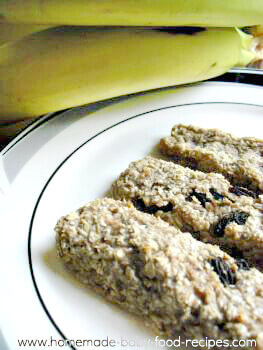
1/2 ripe banana, mashed
approx 3 to 4 tbsp rolled oats
2 tbsp raisins
- Preheat the oven to 350 deg F, 180 deg C.
- Grind the oats in a food processor OR leave them just as they are. The final texture of your fruity bars depends on whether or not you ground the oats – leaving them whole, of course, provides more texture than grinding them. In our picture, the oats were ground to make the pieces smaller, but not to the point where they became powdery.
- Stir the oats into the mashed banana. The amount of oats you need depends on the size of the banana – you need to achieve a ‘doughy’ texture that you can shape with your hands. Stir in the raisins.
- Form the mixture into ‘bars’ using your hands, then place on a lightly greased baking sheet.
- Cook for around 10 to 15 minutes until firm and lightly golden.
- Cool and serve. Freeze leftover bars for up to one month.
Note: One of our followers on Twitter told us she made these for her 20 month old using Grape Nuts instead of oats and they were a huge success! Something else you might like to try.
Readers' Pics
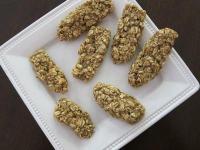
I made the Quick and Easy Fruity Bars without the raisins. These were great to make and store in the freezer to pull out as quick snacks.
Kari
Storing Banana Baby Food
Because bananas are so quick and easy to prepare, it really isn’t worth pureeing or mashing them in advance.
But if you DO choose to do so, you will probably find that they turn a lovely shade of brown!
Whilst this is not harmful to your baby, it does look somewhat unappealing!
To prevent banana baby food from turning brown, stir in a drop or two of lemon or orange juice (please note, however, that citrus MAY cause an allergic reaction in some babies.
Whilst a drop or two should, on the whole, be safe to use, you might like to check with your doctor first).
Don’t miss our unique baby dessert recipe…
Sources
American Family Physician – Latex Allergy
